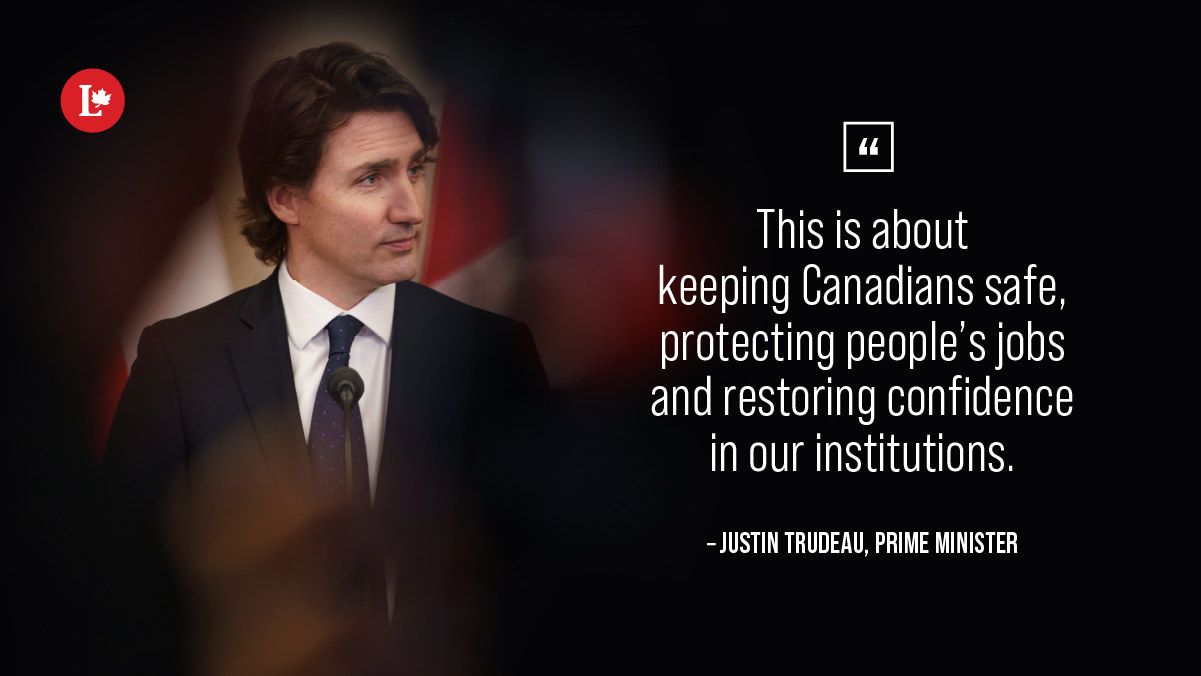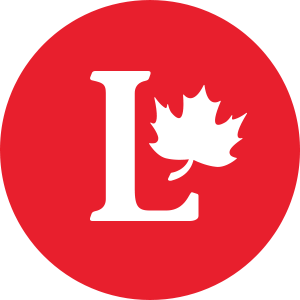Today, Justin Trudeau and the Liberal government provided an important update on the work being done to end the ongoing illegal blockades and occupations across the country – and the support that Canada is providing to Ukraine in the face of continued Russian aggression. |
This important update can be watched here, and his full remarks are below. Prime Minister's remarks regarding the Emergencies Act, blockades, and Ukraine Check against delivery |
Je suis accompagné aujourd’hui de la vice-première ministre Freeland, et des ministres Mendicino, Blair, Lametti. Je suis ici pour faire le point sur les barrages illégaux. Je veux aussi parler de nos efforts pour soutenir l’Ukraine face à l’agression russe. Commençons par la situation ici au Canada. We’re entering the third week of illegal blockades that have been disrupting the lives of too many Canadians. Here in our capital city, families and small businesses have been enduring illegal obstruction of their neighbourhoods. Occupying streets, harassing people, breaking the law: this is not a peaceful protest. At the borders in different places in the country, the blockades are harming our economy and endangering public safety. Critical supply chains have been disrupted. This is hurting workers who rely on these jobs to feed their families. Yesterday, the Ambassador Bridge was reopened between Windsor and Detroit. Our team and I have been working with Ontario and the city of Windsor around the clock. Want to thank officers on the ground, including the RCMP, who played an active role. We now have a responsibility to make sure the bridge remains open. With each illegal blockade, local law enforcement agencies have been acting to keep the peace within their jurisdiction. Despite their best efforts, it is now clear that there are serious challenges to law enforcements’ ability to effectively enforce the law. On Friday, Ontario invoked a state of emergency to respond to the blockades – this was the responsible and necessary thing to do. Today, to continue building on these efforts, the federal government is ready to use more tools at its disposal to get the situation fully under control. After discussions with Cabinet and caucus. After consultation with premiers from all provinces and territories. And after speaking with opposition leaders. The federal government invoked the Emergencies Act to supplement Provincial and Territorial capacity to address the blockades and occupations. I want to be very clear: the scope of these measures will be time-limited, geographically targeted, as well as reasonable and proportionate to the threats they are meant to address. The Emergencies Act will be used to strengthen and support law enforcement agencies at all levels across the country. This is about keeping Canadians safe, protecting people’s jobs and restoring confidence in our institutions. Here’s how the measures we’re taking today will help get the situation under control. The police will be given more tools to restore order in places where public assemblies constitute illegal and dangerous activities, such as blockades and occupations, as seen in Ottawa, the Ambassador Bridge, and elsewhere. These tools include strengthening their ability to impose fines or imprisonment. The government will designate, secure and protect places and infrastructure that are critical to our economy and people’s jobs, including border crossings or airports. We cannot and will not allow illegal and dangerous activities to continue. The Emergencies Act will also allow the government to make sure essential services are rendered, for example, in order to tow vehicles blocking roads. In addition, financial institutions will be authorized or directed to render essential services to help address the situation, including by regulating and prohibiting the use of property to fund or support illegal blockades. Finally, it will enable the RCMP to enforce municipal by-laws and provincial offences where required. That is what the Emergencies Act does. Let me be equally clear about what it does not do. We are not using the Emergencies Act to call in the military. We are not suspending fundamental rights or overriding the Charter of Rights and Freedoms. We are not limiting people’s freedom of speech. We are not limiting freedom of peaceful assembly. We are not preventing people from exercising their right to protest legally. We are reinforcing the principles, values, and institutions that keep all Canadians free. Après des discussions avec le Conseil des ministres et le caucus. Après avoir consulté les premiers ministres de toutes les provinces et tous les territoires. Et après avoir parlé avec les chefs de l’opposition. Le gouvernement fédéral invoque la Loi sur les mesures d’urgence pour compléter les pouvoirs provinciaux et territoriaux visant à gérer l’occupation et les barrages illégaux. Je veux être très clair : ces mesures vont être limitées dans le temps et ciblées géographiquement. Elles vont être raisonnables et proportionnelles aux menaces à la sécurité du Canada. La Loi sur les mesures d’urgence va renforcer et soutenir le travail des policiers. On ne se sert pas de la Loi des mesures d’urgence pour déployer l’armée. On ne suspend pas les droits fondamentaux prévus dans la Charte des droits et libertés. On ne limite pas la liberté d’expression, ni le droit de manifester pacifiquement. Ce qu’on veut, c’est d’assurer la sécurité des Canadiens, protéger les emplois des travailleurs et rétablir la confiance dans nos institutions. The Emergencies Act is not something that’s been used ever, but it exists for a reason. Invoking the Emergencies Act is never the first thing government should do, or even the second. The Act is to be used sparingly, as a last resort. Right now, the situation requires additional tools not held by any other federal, provincial or territorial law. Today, in these circumstances, it is now clear that responsible leadership requires us to do this. These measures must be, and will be, compliant with our Charter of Rights and Freedoms. Indeed, the Emergencies Act was created in the eighties to flow from, and uphold, the Charter. We’ll always defend the rights of Canadians to peaceful assembly, and to freedom of expression. But these blockades are illegal, and if you’re still participating, it’s time to go home now. On a separate track from the Emergencies Act, I want to reassure people that the Canadian Border Services Agency is already turning back non-Canadians trying to enter Canada to participate in blockades. Of course, while we get the situation under control, we’ll continue to have Canadians’ backs. I want to remind affected businesses that, if you’re facing revenue losses, support is available through our wage and rent subsidy programs. We know that downtown Ottawa businesses in particular have been hard hit by these illegal activities. In the coming days, we’ll be launching specific support for these businesses. I know that everyone is tired of the pandemic. We’re hearing your frustration with COVID, and with the temporary measures we had to put forward to keep people safe. I know people are frustrated, I hear it. You have the right to express that frustration, and even your anger with the government. It’s something we’ll always defend in this free and democratic country. But blockading streets and critical infrastructures, and depriving your neighbours of their freedoms is a totally different thing. It has to stop. Tout le monde est fatigué de la pandémie. Il y a d’autres façons de vous exprimer que de participer à des activités illégales et dangereuses. Comme le ministre Duclos l’a dit la semaine passée : les mesures de santé publique sont constamment réévaluées et on va continuer de les modifier en fonction de la science. On va justement avoir quelques annonces à faire à ce sujet dans les prochains jours. Today, I also want to talk about our support for Ukraine. On Saturday, I spoke with President Zelenskyy to reaffirm Canada’s steadfast support and to continue whatever we can to assist Ukraine. Durant la fin de semaine, j’ai aussi eu des appels avec le président du Conseil européen, Charles Michel, avec le chancelier Scholz de l’Allemagne, et avec le président Duda de la Pologne. As part of the collective G7 response to support Ukraine’s economic resilience, today we’re announcing that Canada will offer a loan of up to $500 million to the Government of Ukraine. I want to thank Deputy Prime Minister Freeland for her leadership on this file. This is in addition to the $120 million loan offered earlier in January. On top of financial support, Canada has already taken steps to help Ukraine defend itself, including with the extension of the training mission, Operation UNIFIER. In light of the seriousness of the situation and following conversations with our Ukrainian partners, I’ve approved the provision of $7.8 million worth of lethal equipment and ammunition. This responds to Ukraine’s specific request and is in addition to the non-lethal equipment we’ve already provided. The intent of this support, from Canada and other partners, is to deter further Russian aggression. En raison du sérieux de la situation et après avoir soigneusement examiné la question, j’ai approuvé la demande de l’Ukraine de leur envoyer de l’armement et des munitions. Le Canada se joint donc aux États-Unis, au Royaume-Uni, à la Bulgarie, la République tchèque, l’Estonie, la Lettonie, la Lituanie, aux Pays-Bas et à la Pologne dans l’envoi d’armement. Le but de ce soutien de la part du Canada et de nos autres partenaires est de dissuader la Russie de poursuivre son agression contre l’Ukraine. We’re not seeking confrontation with Russia. But the situation is intensifying rapidly and we’re showing our resolve. It’s important for Canadians and the world to know that Canada will continue supporting Ukraine and its independence, integrity, and sovereignty, including its right to defend itself. Merci. |
|



No comments:
Post a Comment